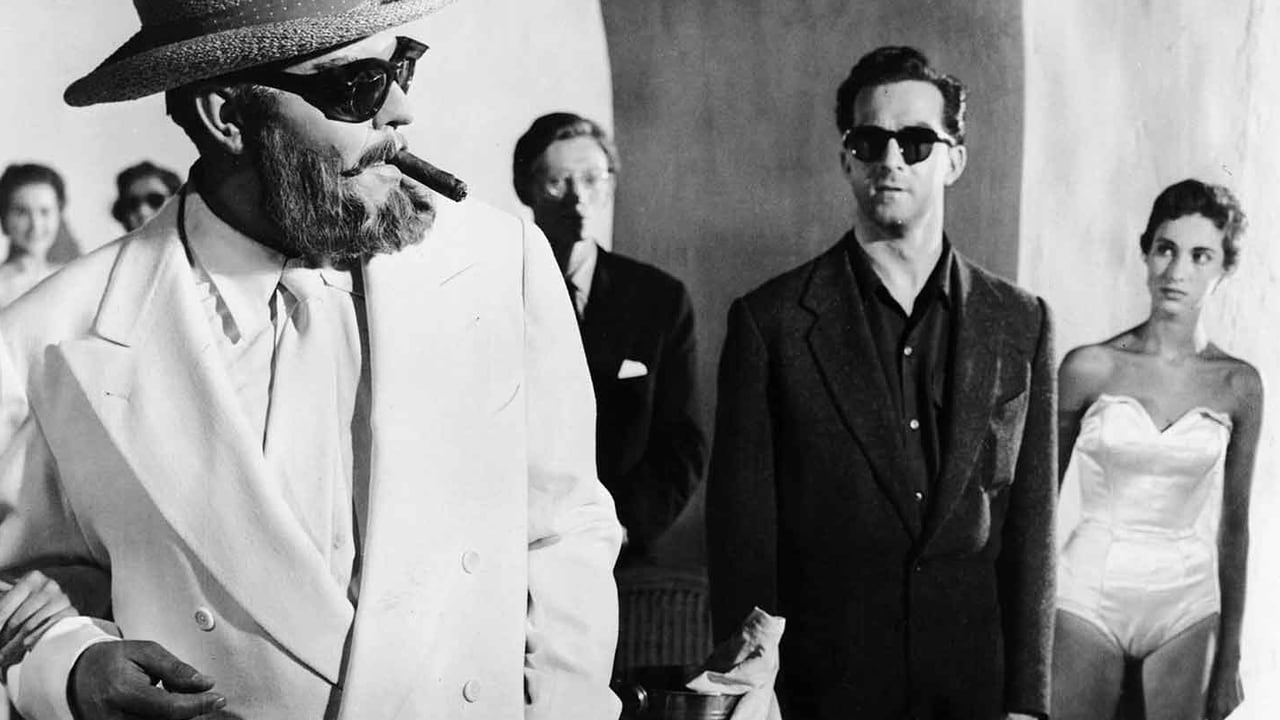

It's fun, it's light, [but] it has a hard time when its tries to get heavy.
... View MoreA lot of perfectly good film show their cards early, establish a unique premise and let the audience explore a topic at a leisurely pace, without much in terms of surprise. this film is not one of those films.
... View MoreThe story, direction, characters, and writing/dialogue is akin to taking a tranquilizer shot to the neck, but everything else was so well done.
... View MoreAmazing worth wacthing. So good. Biased but well made with many good points.
... View MoreConfusing, eccentric, frenzied, playful, indulgent. Not much deep meaning, just Orson Welles using the film medium as his playfield. Fanciful camerawork and flamboyant cast. Not althogether successful, but far more modern than your typical mid-1950s Hollywood fare. **1/2 out of 4.
... View MoreI recently saw this film on a PBS station and it was a bad, fuzzy and grainy print. I understand that there were at least five and possibly six different versions of this film released in Europe and America. I saw the one titled 'Confidential Report.' This film was adapted from the Orson Welles written script 'A Man of Mystery' that aired in April of 1952 as a 30 minute episode of the radio play series 'The Lives of Harry Lime.' Welles expanded his story for the film and his friend Muarice Bessy translated it into a novel. In the film Welles changed the Harry Lime character to Guy Van Stratten (Robert Arden) who, as a cigarette smuggler encounters a dying murder victim, a Naples blackmailer named Bracco (Grégoiré Aslan). With Van Stratten is his dancer girlfriend Milly (Patricia Medina) and as his dying breath Bracco whispers in Milly's ear two names; Arkadin and Sophie. Van Stratten befriends Arkadin's daughter Raina (Paola Mori) and he gets to meet the mysterious millionaire Gregory Arkadin (Orson Welles) who hires him to research his past. Arkadin claims to have no memory prior to 1927 when he found himself in Zürich with 200,000 Francs in his pocket. In the nearly 30 years since he used that money to build his financial empire now worth $100,000,000. He has become an eccentric tycoon hiding from his past who refuses to be photographed and wears a cartoonish disguise of a fake beard, hairpiece, nose and eyebrows giving him the appearance of the mythical King Neptune of the sea. He is like a combination of what Howard Hughes and Michael Jackson would become in power, reclusiveness, eccentricity and altered appearance. He is also fiercely protective of his daughter and harbors an almost incestuous feeling for her. Van Stratten sets out on a globe trotting journey to find Sophie (Katrina Paxinou) to put together pieces of Arkadin's past. He investigates various people with a shady past linked to Arkadin. A contraband dealer in Tangiers (Peter Van Eyck), a flea circus operator in Denmark (Mischa Auer), an antique dealer in Amsterdam (Michael Redgrave), a tailor in Zurich (Akim Tamroff) and in Mexico, a heroin addict (Frédrik O'Brady) and Sophie herself. It's a great international cast of actors which also includes Terence Longdon, Suzanne Flon and Jack Whatling with rich, memorable characters full of mystery, mayhem, murder and dark humor. It features great set decoration from two time Oscar winner for 'Patton' and 'Nicholas and Alexandra' Gil Parrando with Welles overseeing the art direction and costuming as well as being the films star, writer and director. Interesting cinematography in its lighting and camera angles from the lens of Oscar winner for 'The Longest Day' France's Jean Bourgoin. filmed in 1954, the overbooked Welles left production before the final edits to work on two other films. Producer Louis Dolivet, frustrated on the delay to get a finished project released, cut Welles loose and had it edited and released in different forms for different international markets contrary to what Welles would have edited and released as a finished product. The result is a strange film with flashes of Welles genius and remnants of 'Citizen Kane' and 'The Third Man' and a combination of 1940's American Film Noir and 1950's French cinema. In the film I saw some scenes are badly overdubbed and audibly out of sync among its many flaws. Arden is miscast in a lead role and Mori is weak in a supporting but pivotal role but the other characters are so interesting and plentiful and performed very well. The film gets a boost from its music score by Paul Misraki. I'd like to see the better version of this film that was culled from three of the existing versions and would recommend looking for that but whatever version it remains a must see film and would give the one I saw an 8.5 out of 10.
... View MoreThe way I watch films involves a lot of invention. Usually it is in cahoots with the filmmaker, elaborating where he or she would have me.Sometimes it is freed from the images, when they are inadequate or point to external context. But with some Welles projects things are about as perfect as it gets because you know what he would do and didn't, or did and it was undone. By that measure, this is perhaps the greatest Welles film. Its like his radio dramas on which it is based: he gives you something and you fill in the rest with your imagination.But here, the filling in has to do with all the time-shifting the man would have us do. If the main engine for narrative slicing in "Kane" was how a character makes his own story, here it is how a character discovers his. For you to understand my meaning you have to know the story. Spoilers here:One man hires another to discover his past because he cannot recall. Toward the end in all the versions we have, it becomes clear that there never was any memory loss. The rich fellow merely wanted his detective to find out who could reveal his past so that they could be killed. I am certain the Welles intended this to be more ambiguous, and for the man in question played by Welles to be unsure what was recalled, invented by himself, invented by the (untrusted) narrator, invented by the witnesses, true.That's why he planned flashbacks within flashbacks, flashbacks that overlapped and contradicted, that went backwards and sometimes forward (remembering forward). Its why he had multiple narrators overlapping the same events. The anchor in this was the character of his daughter played by his them wife. At this time they were passionately involved and indeed she became pregnant during filming. She was the one that mattered, our designated watcher. So the filmmaker-lover dynamic takes a particularly dense narrative braid here, with sex offscreen mattering as much as all the other things we don't see in the story.Along the way, the shots are more adventuresome than in Kane and many of them as radical as "Evil." Imagine the edit as convoluted and dense as "F for Fake."!I am pretty sure that the sequence at the end was intended to be toward the middle. This is an amazing film experience if you can watch it and construct the possibilities in your own eye, like the detective character.I would list it on my best list, but I only allow myself 2 from any filmmaker, and his 2 slots are taken. But you really should see this, probably in the "comprehensive" version. Its the structure determined by others but with more bits. Ted's Evaluation -- 3 of 3: Worth watching.
... View MoreThere's just something about Orson Welles behind a camera (as well as in front). I saw this movie years ago on a public television station. The print was pathetic, however you could still pick out the extreme angles, deep focus, layered soundtrack and quirky characters that are the Wellesian touch.I recently purchased the Criterion set and was absolutely delighted. The back story of just about any Welles movie is generally at least as exciting as the movie itself, and this one is a doozy.I was watching one of the versions with my wife last year and she asked what year it was made. I think that Welles was perpetually about 50 years ahead of the curve. This is why his movies have a tremendous audience and respect now.
... View More